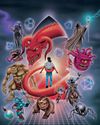The installation artist returns to the scene of his Miami “crime.”

Nothing, nothing, nothing,” Christo exclaims, gesturing first toward the boats clustered in Pelican Harbor and then to the high-rises crowding the shoreline. “There was nothing existing then.” It’s a brilliant December morning, and we’re cruising across Miami’s Biscayne Bay toward the several low islets he and his collaborator-wife, Jeanne-Claude, who died in 2009, made famous 35 years ago as the Surrounded Islands. “As Jeanne-Claude would always say, ‘We return to the scene of the crime!’ ” Christo announces with delight. “That’s always part of it we like to see. The places change so much—that’s reality.”
As our boat approaches the small sandy mass now dubbed Pelican Island but back then simply called No. 8, he points to the aluminum dock and wooden roofs peeking out of the mangrove canopy: “There was nothing on there, either. You couldn’t even walk, it was so dense.”
Like “happy little accidents” populating Bob Ross’s landscapes, the islands are remnants of a 1920s dredging project. Seeds of the invasive Australian pine had found their way onto manmade land and a haphazard ecosystem was formed. Christo and Jeanne-Claude noticed them while crossing the Venetian Causeway (which connects the barrier island of Miami Beach to Miami proper) when they visited the area in 1980. Almost immediately, they had an idea: to wreathe 11 of them in 6.5 million square feet of tropical-pink woven polypropylene, creating a wide, matlike margin of gently pulsing plastic that would remain for two weeks before being removed. To pull off their installation, Christo and Jean-Claude would have to engage the federal, state, and county bureaucratic machinery and hire engineers, scientists, and lawyers. They were nothing if not persistent. (Their 2005 artwork The Gates, in Central Park, was 26 years in the making.)
Diese Geschichte stammt aus der December 24, 2018-Ausgabe von New York magazine.
Starten Sie Ihre 7-tägige kostenlose Testversion von Magzter GOLD, um auf Tausende kuratierte Premium-Storys sowie über 8.000 Zeitschriften und Zeitungen zuzugreifen.
Bereits Abonnent ? Anmelden
Diese Geschichte stammt aus der December 24, 2018-Ausgabe von New York magazine.
Starten Sie Ihre 7-tägige kostenlose Testversion von Magzter GOLD, um auf Tausende kuratierte Premium-Storys sowie über 8.000 Zeitschriften und Zeitungen zuzugreifen.
Bereits Abonnent? Anmelden

LIFE AS A MILLENNIAL STAGE MOM
A journey into the CUTTHROAT and ADORABLE world of professional CHILD ACTORS.

THE NEXT DRUG EPIDEMIC IS BLUE RASPBERRY FLAVORED
When the Amor brothers started selling tanks of flavored nitrous oxide at their chain of head shops, they didn't realize their brand would become synonymous with the country's burgeoning addiction to gas.

Two Texans in Williamsburg
David Nuss and Sarah Martin-Nuss tried to decorate their house on their own— until they realized they needed help: Like, how do we not just go to Pottery Barn?”

ADRIEN BRODY FOUND THE PART
The Brutalist is the best, most personal work he's done since The Pianist.

Art, Basil
Manuela is a farm-to-table gallery for hungry collectors.

'Sometimes a Single Word Is Enough to Open a Door'
How George C. Wolfein collaboration with Audra McDonald-subtly, indelibly reimagined musical theater's most domineering stage mother.

Rolling the Dice on Bird Flu
Denial, resilience, déjà vu.

The Most Dangerous Game
Fifty years on, Dungeons & Dragons has only grown more popular. But it continues to be misunderstood.

88 MINUTES WITH...Andy Kim
The new senator from New Jersey has vowed to shake up the political Establishment, a difficult task in Trump's Washington.

Apex Stomps In
The $44.6 million mega-Stegosaurus goes on view (for a while) at the American Museum of Natural History.